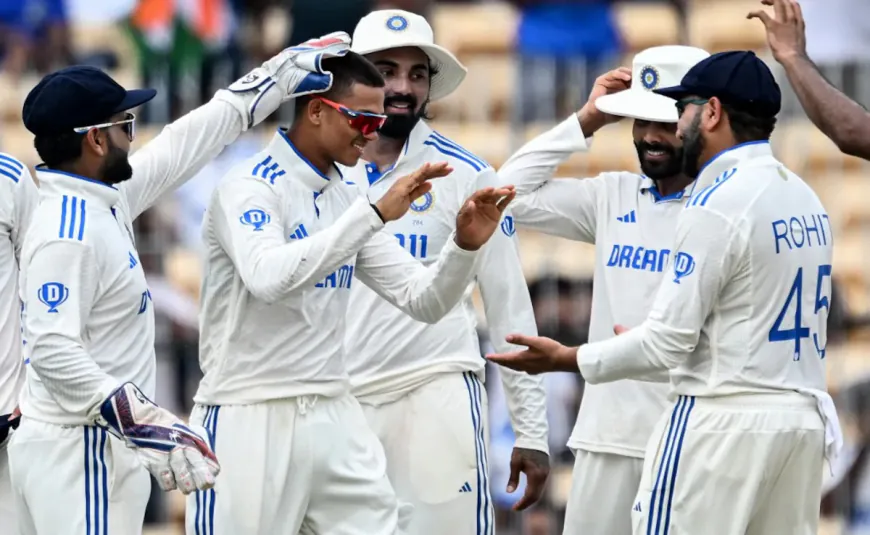ICC's Big Change in Test Cricket Format Puts New Hope for Smaller Nations
Major alteration in Test cricket is seen with the ICC opening the doors for smaller nations to have more opportunities and a better presence in the traditional format of the game.

The International Cricket Council is set to make a big alteration in the style of Test cricket that can transform the game's future. As per reports, the ICC is set to launch four-day Test matches for smaller cricket-playing countries in the 2027 to 2029 World Test Championship period. This is taken as a step to make Test cricket more affordable and cost-friendly for nations that are unable to organize long five-day matches. But not all nations are going to have to adopt this change because India Australia and England will be permitted to play the classic five-day matches in this cycle. These three squads have been exempted because the popularity and stature of the four-day format are high in their nations.
The concept of four-day Tests is to minimize the duration and cost of staging matches. Several nations with smaller cricket-playing populations have not been willing to stage Tests because of the exorbitant cost and the time it takes, given the already congested cricket schedule. With the new four-day format teams will be able to complete a whole three-match Test series in less than three weeks. This will facilitate more series planning and allowing players more time for rest and rehabilitation. The ICC is convinced that this could result in enhanced competition and development of the format particularly for teams with limited budgets.
Jay Shah, the incumbent ICC Chair, is said to have expressed interest in the implementation of four-day Tests. He is said to have talked about it at the recently concluded World Test Championship final at Lord's. His endorsement has lent more seriousness to the proposal and now it is likely that the ICC will approve the shorter version ahead of the next WTC cycle. The transition will not touch some of the most significant rivalries in the sport like the Ashes the Border Gavaskar Trophy and the newly branded Anderson Tendulkar Trophy. These classic series will remain in the classic five-day format to preserve their aura and competitiveness.
While the idea of four-day Tests may seem novel it was originally sanctioned by the ICC all the way back in 2017. Since then a couple of matches have already been contested in the four-day format. England played a four-day Test against Ireland both in 2019 and 2023. More recently they hosted Zimbabwe in a four-day match at Trent Bridge. These contests proved that shorter Test cricket can be competitive and entertaining without sacrificing quality while saving time and expenses.
The reports also detail how the four-day Tests will work. To compensate for the lost time playing hours will be lengthened. Teams will now have to bowl a minimum of 98 overs per day rather than the standard 90. This change will help ensure that the shorter match length will not impact the overall level of the game. The ICC believes that this format will inspire more countries to stage Test series and preserve the allure of red-ball cricket worldwide.
One of the central reasons for the shift is the increasing worry about Test cricket's viability in smaller countries. South Africa, for instance, has struggled to schedule frequent Test matches despite playing well. Indeed South Africa's congested but short calendar has highlighted how challenging it is for such countries to fit in a full Test calendar. Even having won the recently concluded WTC final against Australia the team's Test schedule is lean which makes the case for a more cost-effective and flexible format.
In spite of this latest arrangement the upcoming 2025 to 2027 WTC cycle will also remain unchanged in that it shall stick with the existing five day match format. The new cycle shall commence with a two match Test tournament between Sri Lanka and Bangladesh. Out of the 27 series lined up in this cycle 17 will be two match affairs and just six will be three matches. England Australia and India will play five match series against each other within this phase which is an indication of how the longer format continues to be popular for the top sides.
This move by the ICC is an indication of the changing demands of contemporary cricket. With the advent of T20 leagues and crowded international calendars it is getting difficult for several boards to find room in their schedules for long Test series. By reducing the length of games the ICC is trying to sustain Test cricket while also making it more feasible for low-budget teams with limited resources. The four-day version would be an ideal middle ground where the spirit of Test cricket is preserved and the workload burdened is cut down.
That India Australia and England are exempt indicates how much value the five-day format still holds in these nations. These nations enjoy big crowds and massive revenue from Tests and hence can find it simpler to support longer series. Simultaneously, the flexibility given to other nations will enable them to concentrate on quality instead of quantity and possibly enhance their red ball cricket participation.
It is yet to be known how this transition will be handled by players fans and cricket boards but the motive behind it seems to be aiming at sustainability and world development of the game. If successfully implemented this new plan may be the dawn of a new era in the history of Test cricket where each nation regardless of size gets an equal opportunity to play and compete at the highest level. The willingness of the ICC to adjust to the requirements of all member countries reflects a considerate and inclusive vision for the future of the sport.



 admin
admin